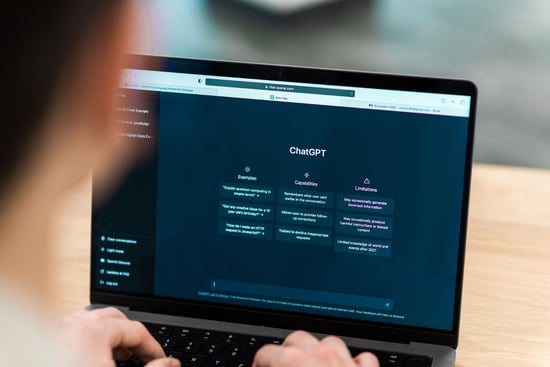
Microsoft has placed itself at the forefront of AI research. They’ve integrated AI technology into products like Dynamics 365, Teams, Power Platform, and Microsoft 365. Microsoft and Chat GPT are designed to benefit users at every level of an organization.
Microsoft increased its effort to extend the reach of Generative AI by making ChatGPT available in Azure OpenAI Service. It allows customers to work with advanced AI models like Dall-E 2, Codex, and GPT 3.5. Thanks to Microsoft’s move, these large language models are now powered by Azure’s supercomputing and enterprise capabilities.
How ChatGPT Changed the Landscape
After making PCs mainstream in the 80s with its DOS and Windows operating systems, Microsoft is working to do the same with ChatGPT and Microsoft Azure AI. They invested over 10 billion dollars in OpenAI, the creators of the ChatGPT chatbot that’s taken over the internet.
Since 2023, Microsoft has infused ChatGPT technology into its Bing search engine and other parts of the Microsoft Ecosystem. The company wants a world where users can tell Word to write a letter or have Excel automatically create a spreadsheet.
Microsoft’s vision of OpenAI Azure technology is to change how users interact with computers and devices permanently. In the next few years, every Microsoft product on the market will have been transformed in some way by Generative AI. They want to help customers realize the benefits of using Azure and Open AI.
Technical Achievements
Small and large organizations are finding ways to leverage Azure OpenAI Service for business value. Microsoft is continuing to work at incorporating more large language models from OpenAI and Azure to help businesses introduce new experiences for customers and workers. Examples of that include:
- Developers using GitHub Copilot to leverage AI models in Azure OpenAI Service to speed up code development with the help of its AI pair programmer
- Adding intelligent recaps to Microsoft Teams Premium, making organizations, teams, and individuals more productive
- Using AI to improve the seller experience via Microsoft Sales Copilot
Microsoft has also introduced a new virtual machine series, Azure ND H100 v5. It features the latest NVIDIA H100 Tensor Core GPUs. They also come with NVIDIA Quantum-2 InfiniBand networking. They’re designed to handle the complexity of AI workloads. Other benefits provided by the ND H100 v5 VMs include the following:
- Faster AI model performance, giving organizations unparalleled computational power
- Optimal processing speed thanks to the use of 4th Generation Intel Xeon Scalable processors
- Low latency networking thanks to the addition of NVIDIA Quantum-2 ConnectX-7 InfiniBand
- Increased performance advantage thanks to 64GB/s bandwidth per GPU
- Enhanced large-scale memory and memory bandwidth to handle workloads containing large datasets
Cutting Edge Global Models
Microsoft recently expanded Azure OpenAI service to bring AI models like GPT-4 to a broader audience. Regions like eastern Australia, eastern Canada, the east United States, eastern Japan, and the southern United Kingdom now have access to the cutting-edge technology. That means organizations worldwide are experiencing the revolutionary power of generative AI.
Users across the globe now have access to Azure Open AI’s GPT-4. That allows Microsoft customers to leverage its capabilities to generate content, improve customer service, document essential information, and other purposes. The goal is to enable businesses to take their operations to new heights, drive more innovative development, and enable company-wide digital transformation.
Responsible Approach to Generative AI
The impact of AI has been felt across every industry. It has boosted productivity, amplified creativity, and vastly reduced the tediousness of performing everyday tasks. Microsoft has committed to ensuring the responsible development of AI systems in a way that engenders trust.
There are challenges involved with generative models like ChatGPT or DALL-E image generation. Those models create new artifacts that have significant reverberations in the real world. There is the danger of these models being manipulated to create false information or realistic images of situations that never occurred.
Because of that, Microsoft employs four levels of migration to address those issues that align with the company’s Responsible AI Standard.
- Employing application-level protections that give control to the customer. An example includes adding context around text creation, explaining that AI generated it, and requiring user approval.
- Adding technical protections like content filtering of input and output.
- Adding process and policy protections, including setting up systems for reporting abuse and establishing service-level agreements (SLAs).
- Provide documentation like design guidelines and notes explaining the benefits a model provides and the extent to which it has been tested.
Microsoft often consults with other companies and developers to improve AI innovation.
Listening to Customers
With generative AI being used in industries like design, marketing, and customer service, it’s clear that the demand for its use will only grow. Microsoft looks to its customer base for inspiration about how to take its AI ecosphere.
For example, car companies are improving the in-car experience for drivers using Azure OpenAI Service. They’re making response features more intuitive to anticipate the needs of drivers. Companies are revolutionizing how they use AI to enhance the coding lifecycle, set up intelligent automation, and improve their service delivery models.
Building the Office of the Future
As Microsoft continues integrating ChatGPT Azure into its suite of products, businesses can anticipate rapid changes in how they approach business workflows. Tasks that used to take hours, like creating business documentation or creating a code outline for a new website, can be done much more quickly.
At its best, AI brings out the best in humans and opens a path to more significant innovation. It’s about enhancing people’s ability to work to their fullest potential. Internet eBusiness Solutions (IES) provides organizations with the knowledge and experience to use AI technology to become more productive and efficient at every level.
Learn more about the benefits of partnering with IES by speaking with one of our solutions experts. We can ensure your company stays at the forefront of emerging AI technologies.


